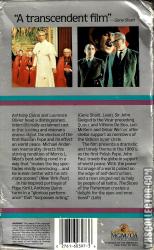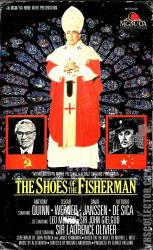Shoes of the Fisherman
Catalog Number
MV700379
-
Primary Distributor (If not listed, select "OTHER")
Catalog Number
MV700379
Primary Distributor (If not listed, select "OTHER")
Release Year
Country
N/A (NTSC)
N/A | N/A | N/A
N/A | N/A
Shoes of the Fisherman (1968)
Additional Information
Additional Information
In a last desperate effort to prevent World War III, a secret meeting is arranged. One man is called on to succeed where all the world leaders have failed. That man was once a prisoner in a Russia labor camp. He is now Pope.
A Pope contends with the prospects of nuclear world destruction in this Cold-War saga of religious faith and international politics. (Anthony Quinn) plays a Russian priest who has spent 20 years in a Siberian labor camp. When Russian and Chinese relations deteriorate, Russian Premier Kamenev (Laurence Olivier) releases him and he is made a cardinal. Kamenev wishes to have a representative at the Vatican in Rome for future political situations. When the Pope (John Gielgud) dies, a series of events makes the Russian priest the first Pope from a communist country. Taking the name of the saint who spread the gospel to Russia, he becomes Pope Kiril Lakota. He often leaves the Vatican in disguise to mingle with the people to remain in touch with the poor and the needy. When millions of Chinese face starvation, the Pope offers to sell the riches of the church on order to feed the hungry, and he asks that all wealthy countries do the same. David Janssen is the television reporter stationed in Rome whose wife (Barbara Jefford) receives counseling from Kiril, unaware he is the Pope. In a symbolic gesture, Kiril offers his crown as a down payment in an attempt to bring world peace and end the starving of millions. Although a fine drama with a competent international cast, the movie failed at the box office to recoup the 9-million-dollar production costs.
Set during the height of the Cold War, The Shoes of the Fisherman opens as protagonist Kiril Pavlovich Lakota (Anthony Quinn), the Metropolitan Archbishop of Lviv (or Lvov as it is spelled in the movie adaptation), is unexpectedly set free after twenty years in a Siberian labour camp by his former jailer, Piotr Ilyich Kamenev (Laurence Olivier), now the premier of the Soviet Union.
He is sent to Rome, where the elderly fictional Pope Pius XIII (John Gielgud) raises him to the cardinalate in the title of St. Athanasius. Lakota is reluctant, begging to be given "a simple mission with simple people," but the Pope insists that he kneel and receive the scarlet zucchetto that designates the rank of cardinal.
When the Pontiff suddenly collapses and dies, the process of a papal conclave begins, and Cardinal Lakota participates as one of the electors. During the sede vacante, two cardinals in particular, Cardinal Leone (Leo McKern) and Cardinal Rinaldi (Vittorio De Sica) are shown to be papabili (candidates). After seven ballots of deadlock, Lakota finds himself elected Pope as a compromise candidate (suggested by Cardinal Rinaldi) by acclamation after the Cardinals, unable to decide between the leading candidates, interview him and are impressed by his ideas and his humility. Lakota takes the name of Pope Kiril (using his baptismal name). Meanwhile, the world is on the brink of nuclear war due to a Chinese-Soviet feud made worse by a famine caused by trade restrictions brought against China by the United States.
The evening after his election, Pope Kiril, with the help of his personal aide Gelasio (Arnoldo Foà), sneaks out of the Vatican and explores the city of Rome dressed as a priest. By chance he encounters Dr. Ruth Faber, who is involved in a troubled marriage with a Rome-based television journalist, George Faber (David Janssen). Later, the Pope returns to the Soviet Union to meet privately with Kamenev and chairman Peng (Burt Kwouk) of China to discuss the ongoing crisis.
Pope Kiril realises that if the troubles in China continue, the cost would be a war that could ultimately rip the world apart. Knowing this, he must seek to convince the West as well as the Catholic Church to open up its resources to aid. At his papal coronation, Kiril removes his tiara (in a gesture of humility) and states this intent to give away a majority of Church's riches, much to the delight of the crowds in St. Peter's Square below.
A major secondary plot in the film (and the novel) is the Pope's relationship with a theologian and scientist, Father Telemond (Jean Telemond in the book, David Telemond in the film). The Pope becomes a close personal friend of Telemond (Oskar Werner). To his deep regret, in his official capacity, he must allow the Holy Office to censure Telemond for his heterodox views. To the Pope's deep grief, the shock of the censure, combined with his chronic medical problems, eventually kills Father Telemond, who has been slowly dying all this time from a cerebral aneurysm.
Release Date: November 14, 1968
Distrib: MGM
A Pope contends with the prospects of nuclear world destruction in this Cold-War saga of religious faith and international politics. (Anthony Quinn) plays a Russian priest who has spent 20 years in a Siberian labor camp. When Russian and Chinese relations deteriorate, Russian Premier Kamenev (Laurence Olivier) releases him and he is made a cardinal. Kamenev wishes to have a representative at the Vatican in Rome for future political situations. When the Pope (John Gielgud) dies, a series of events makes the Russian priest the first Pope from a communist country. Taking the name of the saint who spread the gospel to Russia, he becomes Pope Kiril Lakota. He often leaves the Vatican in disguise to mingle with the people to remain in touch with the poor and the needy. When millions of Chinese face starvation, the Pope offers to sell the riches of the church on order to feed the hungry, and he asks that all wealthy countries do the same. David Janssen is the television reporter stationed in Rome whose wife (Barbara Jefford) receives counseling from Kiril, unaware he is the Pope. In a symbolic gesture, Kiril offers his crown as a down payment in an attempt to bring world peace and end the starving of millions. Although a fine drama with a competent international cast, the movie failed at the box office to recoup the 9-million-dollar production costs.
Set during the height of the Cold War, The Shoes of the Fisherman opens as protagonist Kiril Pavlovich Lakota (Anthony Quinn), the Metropolitan Archbishop of Lviv (or Lvov as it is spelled in the movie adaptation), is unexpectedly set free after twenty years in a Siberian labour camp by his former jailer, Piotr Ilyich Kamenev (Laurence Olivier), now the premier of the Soviet Union.
He is sent to Rome, where the elderly fictional Pope Pius XIII (John Gielgud) raises him to the cardinalate in the title of St. Athanasius. Lakota is reluctant, begging to be given "a simple mission with simple people," but the Pope insists that he kneel and receive the scarlet zucchetto that designates the rank of cardinal.
When the Pontiff suddenly collapses and dies, the process of a papal conclave begins, and Cardinal Lakota participates as one of the electors. During the sede vacante, two cardinals in particular, Cardinal Leone (Leo McKern) and Cardinal Rinaldi (Vittorio De Sica) are shown to be papabili (candidates). After seven ballots of deadlock, Lakota finds himself elected Pope as a compromise candidate (suggested by Cardinal Rinaldi) by acclamation after the Cardinals, unable to decide between the leading candidates, interview him and are impressed by his ideas and his humility. Lakota takes the name of Pope Kiril (using his baptismal name). Meanwhile, the world is on the brink of nuclear war due to a Chinese-Soviet feud made worse by a famine caused by trade restrictions brought against China by the United States.
The evening after his election, Pope Kiril, with the help of his personal aide Gelasio (Arnoldo Foà), sneaks out of the Vatican and explores the city of Rome dressed as a priest. By chance he encounters Dr. Ruth Faber, who is involved in a troubled marriage with a Rome-based television journalist, George Faber (David Janssen). Later, the Pope returns to the Soviet Union to meet privately with Kamenev and chairman Peng (Burt Kwouk) of China to discuss the ongoing crisis.
Pope Kiril realises that if the troubles in China continue, the cost would be a war that could ultimately rip the world apart. Knowing this, he must seek to convince the West as well as the Catholic Church to open up its resources to aid. At his papal coronation, Kiril removes his tiara (in a gesture of humility) and states this intent to give away a majority of Church's riches, much to the delight of the crowds in St. Peter's Square below.
A major secondary plot in the film (and the novel) is the Pope's relationship with a theologian and scientist, Father Telemond (Jean Telemond in the book, David Telemond in the film). The Pope becomes a close personal friend of Telemond (Oskar Werner). To his deep regret, in his official capacity, he must allow the Holy Office to censure Telemond for his heterodox views. To the Pope's deep grief, the shock of the censure, combined with his chronic medical problems, eventually kills Father Telemond, who has been slowly dying all this time from a cerebral aneurysm.
Release Date: November 14, 1968
Distrib: MGM
Related Links






Comments0
Login / Register to post comments